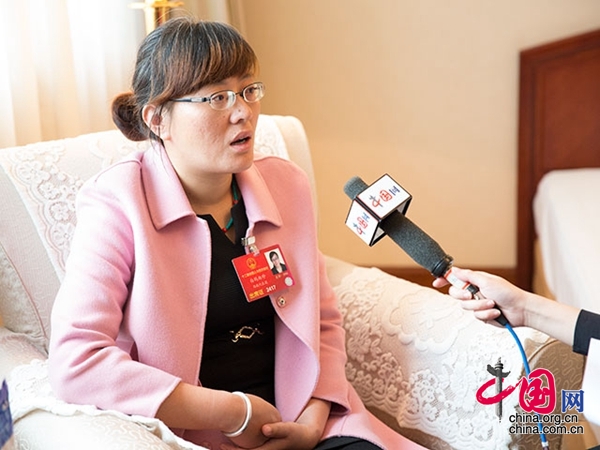The pulse: On the road to poverty relief
chinagate.cn by Liu Hui, March 21, 2016 Adjust font size:
|
Pema Chodron, a deputy to the National People's Congress (NPC) as well as a member of the Party Committee in Dexing Village of Motuo County, talks about the local villagers’ lives and their ways of rising from poverty during the "Two Sessions" in Beijing. [chinagate.cn] |
Pema Chodron, a regular contributor to poverty reduction in Motuo County (also known as Mêdog or Metok) of the Nyingtri (Nyingchi) Prefecture in southwest China's Tibetan Autonomous Region, shared a wide variety of updates about the traditional region in an exclusive interview with China.org.cn during the "Two Sessions" this year in Beijing.
"Motuo," written as "Bka'gyur," in Tibetan Buddhist scripture, means "hidden lotus," the purest and holiest region isolated in eastern Tibet. It used to be considered the only county in China without a single road or highway leading to it until the end of 2013. Those who live in the mysterious land are almost untouched by the modern world and tagged with poverty. People living there are found in a primitive state due to a lack of utilizable resources and amenity caused by bad road conditions.
As an old Chinese saying goes, "If you want to be rich, you must first build roads." Pema recalled that she proposed such a motion to the National People's Congress (NPC) on road construction earlier in 2013.
"The local residents, mainly of the Menba and Luoba ethnic groups, have suffered greatly due to its poor road connectivity. It takes several days to reach the outside. Many residents with acute diseases had a higher chance of dying halfway before they rush to look for a cure. Thanks to the construction of transportation facilities, it is now easy for them to reach their destinations either by plane or train," said Pema.
In Pema's mind, road construction has brought hope to the locals and helped them experience more.
"More and more outsiders are attracted to enjoy our breathtaking landscapes in Motuo County, where agricultural tourism has played an important role in sustaining ethnic minority cultures and contributing to economic growth. Farmers began to be self-employed when their annual revenues increased from about 5,000 yuan (U.S. $768) in 2013 to 8600 yuan (U.S. $1,320) in 2015," explained Pema.
"Motuo embraces 46 administrative villages inhabited by very poor people living in shanties, and the majority of them are unable to move out because of bad road conditions and unaffordable house prices farther away. Under the supervision of the central government, relocation assistance was delivered last year. Twenty households living in Dexing village, where I was transferred as a village-based cadre, were relocated into newly built houses," continued Pema.
According to Pema, locals have begun to shake off poverty but a steep uphill struggle to become wealthy remains.
"Targeted measures should be adopted to enhance the viability of locals' operations in rural management," claimed Pema, adding that local residents need to enhance their existing awareness and go deeper in acquiring strong technical skills when it comes to the development of the rural economy.
"The “know-how” involved here is understanding how to make technology work for you. Technical skills can not only increase one's income but also bring benefits to one's neighbors. One of our villagers has inspired locals to repair more roads to facilitate their daily life as the villager learned how to build roads as a result of our training processes," insisted Pema.
Nowadays, everything is on the right track and going smoothly. However, Pema is still concerned about talent shortage on her county’s way to poverty relief.
Pema thinks a lack of qualified and skilled workers has challenged Motuo County’s attempt to respond to tech demands of rural management. However, she believes that the people in Motuo can construct their hometown better with their own hands.

